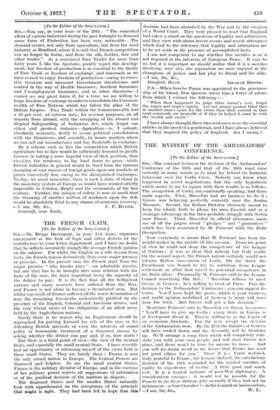THE MYSTERY OF THE AMBASSADORS' CONFERENCE.
[To the Editor of the SPECTATOR.] SIR,—The contrast between the decision of the Ambassadors' Conference of the 10th and that of the 26th must raise curiosity in many minds as to what lay behind its fantastic behaviour over the Corfu Crisis. Nobody can know what happened in secret negotiations, but the only hypothesis which seems to me to square with their results is as follows. The occupation of Corfu, internationally speaking, had three main aspects. First, Mussolini had no business to do it ;
Greece was behaving perfectly correctly over the Janina Massacre. Second, the Italian Dictator obviously meant to keep the island, both to please his own Fascisti and as _a strategic advantage in the then probable struggle with Serbia over Fiume. Third, Mussolini in official utterances made use of all the jargon about " pledges " and " guarantees " which has been associated by M. Poineare with the Ruhr Occupation.
Now everybody is aware that M. Poineare has been the weight-maker in the middle of this see-saw. From his point of view he could not deny the competence of the League of Nations ; it was so clear that nobody but Italy could. On the second aspect, the French nation certainly would not tolerate Italian annexation of Corfu. On the third, the Frenchman was bound to try to withdraw from League settlement an affair that raised its potential competence in the Ruhr affair. Presumably M. Poineare said to the League Council something like this : " Mussolini refuses to meet Greece at Geneva ; he's willing to treat at Paris. Pass the decision to the Ambassadors' Conference ; you can suggest its terms. You'll have kept the peace, which is your business, and world opinion mobilized at Geneva is what will have done the trick. And Greece will get a fair decision."
Meantime Poincare said to Mussolini via Baron Avezzano : " You'll have to give up Corfu ; every State in Europe is at fever-point about it. They're willing to go the length of an economic blockade. For the rest, accept the decision of the Ambassadors now. By the 27th the lunatics at Geneva will have cooled down, and the Assembly will be breaking up. We'll arrange a coup then which will completely rein- state you with your own people, and will show Greece her place, and there won't be time for anyone to move. And you will no doubt recall in the future that France has used her good offices for you." There it is : Corfu restored, Italy grateful to France, the League shelved, the satisfactory decision of the 10th rescinded for the cynical sacrifice of equity to expediency of to-day. A little good and much evil. It is a typical instance of post-War diplomacy. .A consideration emerges : it would not be possible for the Powers to do these dubious jobs so easily if they had not an instrument—a Star Chamber l—in the Council of Ambassadors.
—I am, Sir,
W.










































 Previous page
Previous page